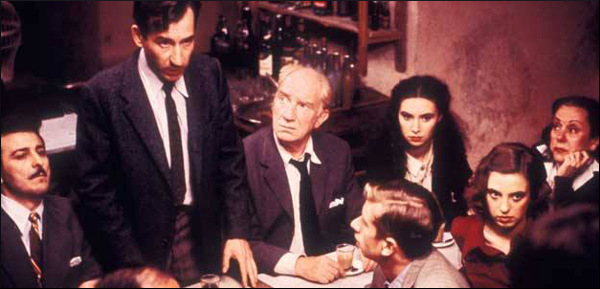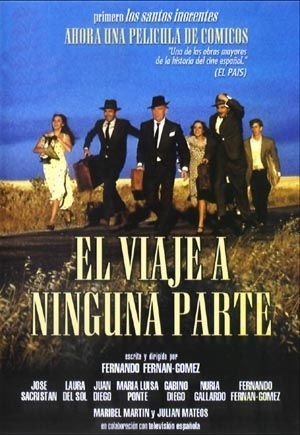Before there was cinema, TV, or radio, the world of entertainment circled around stage actors. And, in some cases, there were travelling actors, who lived on the road with their theater company, offering entertainment in various towns. El viaje a ninguna parte (Voyage to Nowhere) is set in Spain during the Franco regime, as one such group of actors enjoys the last gasps of this adventurous way of life, while comedians lose popularity and get older. We meet Galván, his father Don Arturo, his friend Maldonado, and his girlfriend Juanita as they prepare for a typical day, when Galván is suddenly greeted with the arrival of a 17-year-old son he has never met and who has come to stay with him. This is all narrated to us by an old Galván, sitting in a shadowy room talking to a man taking notes.
"I don’t think I’ve ever seen a movie that so correctly captures the essence of what being an actor is all about."
Such is the premise of this deceptively simple story brought to us by Fernando Fernán Gómez. He is one of the cornerstones of Spanish cinema, an actor with over 200 movie roles to his name (The Spirit of the Beehive, All About My Mother) and 30 completed features as director. Regarding this one, which he directed, I don’t think I’ve ever seen a movie that so correctly captures the essence of what being an actor is all about. I’ve spent a lot of time with actors, both as a student filmmaker and working in a casting agency for two years. I don’t think any actor can watch this film and not feel complete identification with Galván. One of the most heartbreaking and inspired moments comes when his father, Don Arturo, is chosen by the “ peliculeros ” – the people who make films, the travelling actors’ natural predators – to play a bit part in a movie, but he can’t move away from the dramatic, overdone speech required on stage and successfully deliver his lines for the cameras.

As we move through the years with Galván, watching his adventures and frequent misfortunes, we regularly flash-forward to later times in his life or to interruptions from the man taking notes, who wants to know about particulars or keep track of dates. Without revealing too much about the plot, let’s just say that memory is a tricky thing. El viaje a ninguna parte won the Goya Award for Best Picture in 1986, the first year this ceremony took place (it is the equivalent of the American Oscars). It deserves every award thrown at it, but also deserves to be more widely seen. It’s a heartfelt homage to outsiders, to the marginal participants of the world of acting, and to those who remain faithful to their way of life, even as it crumbles beneath their feet. It achieves both laughter and emotion without needing melodrama or overly heart-tugging scenes, instead having us share two hours with a group of fleshed-out characters who immediately earn our sympathy. There are many wonderful scenes that play out like picaresque comedy while subtly adding to our understanding of Galván and company.
"It deserves every award thrown at it, but also deserves to be more widely seen. It’s a heartfelt homage to outsiders, to the marginal participants of the world of acting, and to those who remain faithful to their way of life, even as it crumbles beneath their feet."
Before being a film, Voyage to Nowhere was first a radio play and then a novel, both by Fernán Gómez, which accounts for the authentic windfall of and memorable dialogue. A big deal is made about a character’s gallego accent, mostly by himself.





